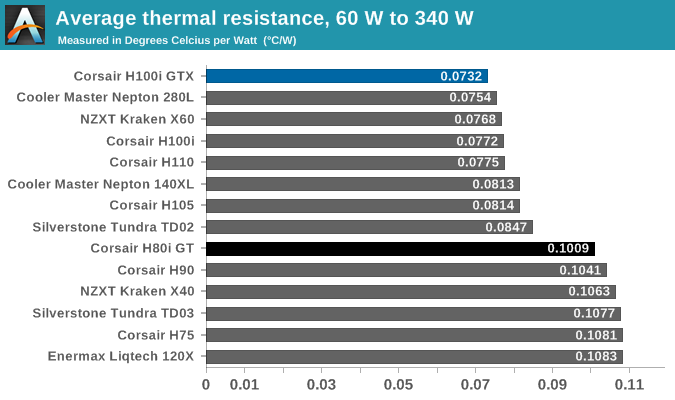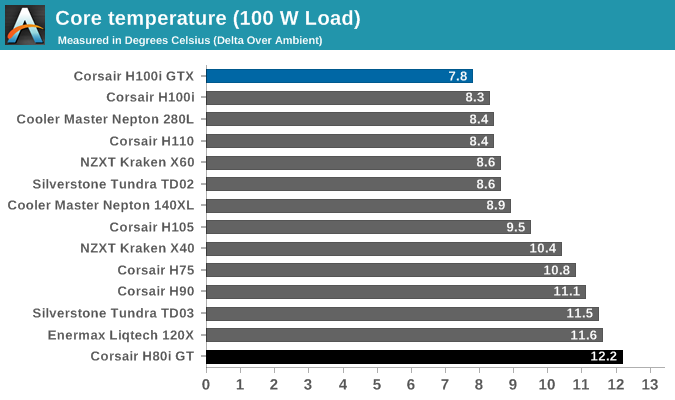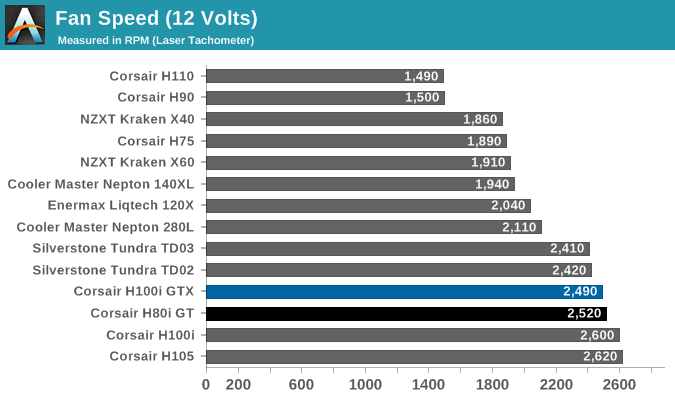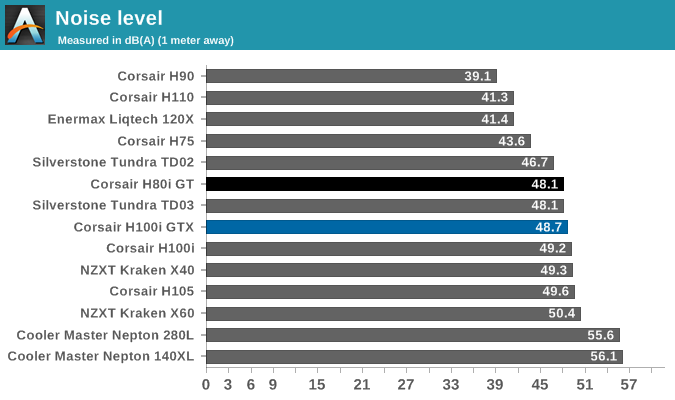The Corsair H80i GT and H100i GTX AIO Coolers Review
by E. Fylladitakis on November 16, 2015 8:00 AM EST- Posted in
- Cases/Cooling/PSUs
- Corsair
- Liquid Cooling
- Corsair Link
Testing Results, Maximum Fan Speed (12 Volts)
We'll start off our testing with our fans running at their maximum fan speed and normal operating voltage (12V).


| Core Temperature, Constant Thermal Load (Max Fan Speed) |
The Corsair H100i GTX is having a field day when the fans and the pump are running at their maximum rated speeds. It displayed the best low load performance of every AIO cooler we have ever tested and heavy load performance comparable to that of the best 280 mm radiator coolers available. Meanwhile the average thermal resistance is just 0.0732 °C/W, which is also the best that we have recorded to this date and outpacing even Cooler Master's super loud 280 mm offering, the Nepton 280L. It can be noticed that the performance difference over the H100i is relatively small, but it is distinctive and enough to place the H100i GTX at the top of our performance charts.
On the other hand, the H80i GT did not fare as well as it displayed middling low power thermal performance. The performance slightly improves as the load increases and eventually it outpaces most of the similarly sized coolers. However, it falls significantly behind the 140 mm Nepton 140 XL and all of the 240/280 mm radiator coolers. For having two powerful 120 mm fans, the H80i GT could fare a little better.


The high performance of the H100i GTX has a significant downside however: noise. That noise does not only come from the two very powerful fans, but from the pump as well, which is making a clearly perceptible whining noise while operating at its maximum speed. It is not the loudest AIO cooler that we have ever tested but 48.7 dB(A) are way above what we consider a comfortable limit.
As the H80i GT is using the same fans and pump, the noise figures were expected to be similar. The H80i GT is actually slightly quieter, but the difference is imperceptible to the human ear. Otherwise it's worth noting that despite the use of two fans, the H80i GT actually is not louder than most other high performance 120 mm radiator fans. But the 140 mm models seem capable of significantly greater thermal performance or similar thermal performance at much lower noise levels.










47 Comments
View All Comments
zeeBomb - Monday, November 16, 2015 - link
I came for the coolers. I wanna stay COOL.Der2 - Monday, November 16, 2015 - link
A cooling system is essential for a great PC build.ShortWicky - Monday, November 16, 2015 - link
Brilliant deduction Einstein, do go on with more glimmers of genius insightBlack Obsidian - Monday, November 16, 2015 - link
Fyll, it's possible that you've covered this before, but in cases where AIO coolers have the same heatsink/block unit as these two do, is the absolute thermal resistance essentially measuring the effectiveness of their radiators and fans, or are there other potential variables to consider?I'm guessing, for instance, that the days of significant variations in the quality of machining of the heatsink contact surface are long over? If I never have to lap another heatsink, it'll be too soon...
basroil - Monday, November 16, 2015 - link
Thermal resistance is affected by:1) Overall sink and radiator design
2) Fluid flow rate
3) Fluid type (not much change since all use basically the same thing)
4) Fan speed and efficiency
5) Mounting pressure
6) Thermal paste quality
Assuming 1-3 are identical (because of OEM designs), it's fan and paste performance and mounting pressure you see change thermal conductance
nathanddrews - Monday, November 16, 2015 - link
What AIO coolers have the quietest pumps (least whine)?rpjkw11 - Monday, November 16, 2015 - link
Nothing in this review shows a need to replace my Noctua NH-D15, cooling an i7 5960X @ 4.3 and an Asus STRIX GTX 980Ti. I'm having absolutely no problem with heat or air flow. One of these days I'll take the plunge and try a water AIO, but this ain't the day.Thanks for the great review!
shaolin95 - Monday, November 16, 2015 - link
So if "I'm having absolutely no problem with heat or air flow" then why did you read this whole thing for? ;)I much rather have an AIO for a clean look, easier to clean than a big air cooler and trust me...I used to love them! I had the D14 with 3 massive fans AND shrouds before. I started the thread for it in case you are curious how it used to look:
http://www.overclock.net/t/628569/official-noctua-...
Not saying that Air coolers are not good...the D15 is the top in my list but I prefer AIO.
Chaitanya - Monday, November 16, 2015 - link
A good air cooler is still better than most of the entry level/mid segment AIOs. AIOs have a copper heat plate and aluminium radiator, couple that with non-refillable system you might face a failed pump due to corroded metal. If you want an AIO better be ready to spend on likes of Swiftech/EKWB one as they don't mix metals together in the system and are user serviceable and expandable.Morawka - Tuesday, November 17, 2015 - link
AIO are disposable.. you use then for 3-5 years then that's it, 50% water has evaporated. You could open it up, but good luck with that.